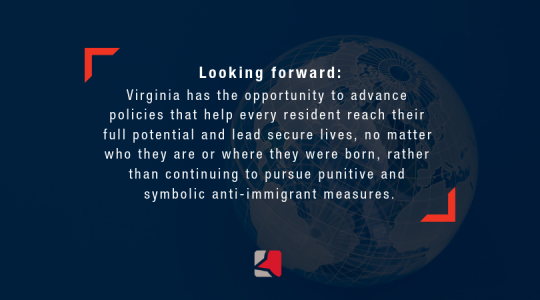March 18, 2019
Missed Opportunities for Virginia Immigrants in 2019 Legislative Session
Virginians of every immigration status are paying taxes and contributing to our economy and communities. The 2019 General Assembly session provided a few key opportunities to improve the livelihoods of unauthorized residents in Virginia. Unfortunately, legislators rejected the chance to protect and broaden in-state tuition for young Virginians regardless of immigration status and failed to advance bipartisan proposals for driver privilege cards. Instead, both chambers passed punitive anti-immigrant legislation that seeks to empower Immigration and Customs Enforcement (ICE) and threaten vulnerable communities across the commonwealth.
Driving Privileges
Virginians are safer when more of the drivers on our roads are trained, tested, licensed, and insured. That’s why Virginia has such strong education and training requirements for new drivers. Our communities and economy are stronger when more residents are able to participate in everyday life without breaking the rules of the road by driving without a license. Twelve states and the District of Columbia already allow unauthorized immigrants to obtain some form of driver’s card.
HB 1843, proposed by Del. Bloxom, a Republican legislator from the Eastern Shore, and HB 2025, proposed by Del. Tran, a Democrat from Northern Virginia, would have provided driver privilege cards to applicants who earn income in Virginia, file a tax return, and comply with Virginia’s insurance requirements. While either one of these bills could have been a step forward for farmers in rural localities and many Virginia families, neither were passed by the House Transportation Committee.
SB 1641, proposed by Sen. Boysko, was incorporated into SB 1740, proposed by Sen. Surovell. Unfortunately, neither piece of legislation made it to the Senate floor for a vote.
Expanding access to driver’s licenses for unauthorized immigrants would increase safety and help Virginia’s economy and communities. General Assembly lawmakers should consider similar legislation again in 2020, and send a bill to the governor’s desk that meaningfully expands driving privileges.
In-State Tuition
The availability of in-state tuition rates at public colleges and universities for Virginians provides a pathway to better jobs and opportunities that benefits students and the state economy. And looking at Virginia’s experience over the last four years, it’s clear that allowing Virginia students who have deferred action immigration status to pay in-state rates does not create a cost burden to the state or result in overcrowded classrooms.
HB 1882 by Del. Keam would have provided in-state tuition to permanent residents who graduated from high school (or received equivalent certification) in Virginia and enrolled at one of our public institutions of higher education. A similar bill, SB 1640, was proposed by Sen. Boysko in the Senate.
The House bill failed to make it out of the subcommittee, while the Senate version was rejected by the Education and Health Committee.
Being able to go to college can make a big difference in the lives of immigrants in Virginia and would have boosted their ability to contribute to the state economy. The General Assembly should reconsider expanding access to in-state tuition in 2020.
An Unwelcoming Message to Virginians
Once again, conservative state lawmakers are proposing hostile bills designed to further limit the autonomy of local governments and further entangle local communities with federal enforcement activities.
HB2270 requires “The sheriff, jail superintendent, or other official in charge of a local correctional facility or regional jail in which an alien is incarcerated shall notify U.S. Immigration and Customs Enforcement of the release or discharge of the alien forthwith as soon as the release date is known.” This would force local and regional jails to notify ICE every time any non-citizen immigrant is due to be released from the facility, regardless of whether or not they’re unauthorized or ICE has any interest in the person.
SB1156 states that “No locality shall adopt any ordinance, procedure, or policy that intends to restrict the enforcement of federal immigration laws.” This may, depending on interpretation, ban existing policies by local police and sheriff’s departments that they will not ask victims and witnesses of crimes about their immigration status. In doing so, community members may be reluctant to report crimes and public trust in law enforcement may decline.
While the governor is expected to veto both measures, these attempts at implementing anti-immigrant measures can still cause harm through the message they send, even if they never become law. And Virginians should be vigilant against potential threats to immigrant communities in any form.

A More Welcoming Commonwealth in 2020
The commonwealth is home to more than 1 million immigrants, and many Virginia families include members with a range of immigration statuses. In fact, nearly 1 in 4 children in Virginia comes from families with at least one immigrant parent. Virginia’s immigrant communities are more engaged than ever before. Rather than pursuing punitive and symbolic anti-immigrant measures, our state lawmakers should acknowledge the contributions of Virginia’s immigrants to our communities and take sensible steps forward to allow immigrants to fully contribute to the state’s economy.
Category:
Immigration

